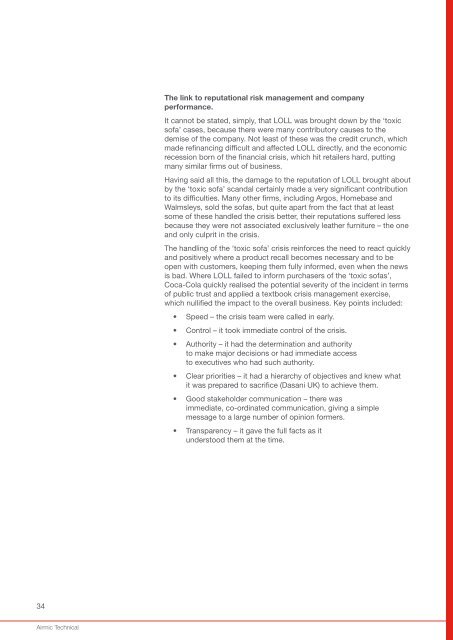Defining and managing reputation risk
TkDn8
TkDn8
Create successful ePaper yourself
Turn your PDF publications into a flip-book with our unique Google optimized e-Paper software.
The link to <strong>reputation</strong>al <strong>risk</strong> management <strong>and</strong> company<br />
performance.<br />
It cannot be stated, simply, that LOLL was brought down by the ‘toxic<br />
sofa’ cases, because there were many contributory causes to the<br />
demise of the company. Not least of these was the credit crunch, which<br />
made refinancing difficult <strong>and</strong> affected LOLL directly, <strong>and</strong> the economic<br />
recession born of the financial crisis, which hit retailers hard, putting<br />
many similar firms out of business.<br />
Having said all this, the damage to the <strong>reputation</strong> of LOLL brought about<br />
by the ‘toxic sofa’ sc<strong>and</strong>al certainly made a very significant contribution<br />
to its difficulties. Many other firms, including Argos, Homebase <strong>and</strong><br />
Walmsleys, sold the sofas, but quite apart from the fact that at least<br />
some of these h<strong>and</strong>led the crisis better, their <strong>reputation</strong>s suffered less<br />
because they were not associated exclusively leather furniture – the one<br />
<strong>and</strong> only culprit in the crisis.<br />
The h<strong>and</strong>ling of the ‘toxic sofa’ crisis reinforces the need to react quickly<br />
<strong>and</strong> positively where a product recall becomes necessary <strong>and</strong> to be<br />
open with customers, keeping them fully informed, even when the news<br />
is bad. Where LOLL failed to inform purchasers of the ‘toxic sofas’,<br />
Coca-Cola quickly realised the potential severity of the incident in terms<br />
of public trust <strong>and</strong> applied a textbook crisis management exercise,<br />
which nullified the impact to the overall business. Key points included:<br />
• Speed – the crisis team were called in early.<br />
• Control – it took immediate control of the crisis.<br />
• Authority – it had the determination <strong>and</strong> authority<br />
to make major decisions or had immediate access<br />
to executives who had such authority.<br />
• Clear priorities – it had a hierarchy of objectives <strong>and</strong> knew what<br />
it was prepared to sacrifice (Dasani UK) to achieve them.<br />
• Good stakeholder communication – there was<br />
immediate, co-ordinated communication, giving a simple<br />
message to a large number of opinion formers.<br />
• Transparency – it gave the full facts as it<br />
understood them at the time.<br />
34<br />
Airmic Technical


